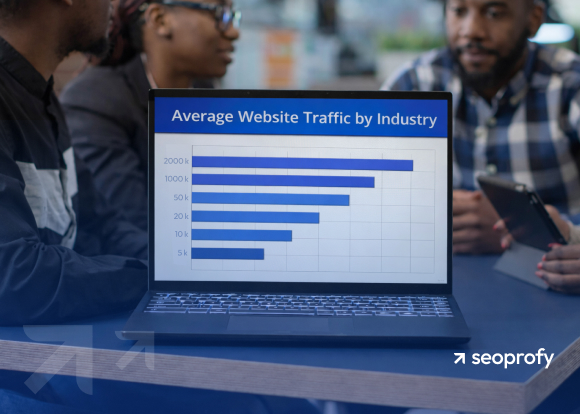The reason some businesses pop up in local search results and some don’t isn’t by chance; it’s thanks to local SEO for small businesses, and yours can benefit from search engine marketing as well.
Every day, countless potential customers search online for products and services. The main question is: are you appearing in their searches? If your website isn’t optimized, the chances are low. But with the best practices we share in this local SEO guide for small businesses, you can improve your visibility and increase both web and foot traffic, as well as sales.
- Local SEO targets customers nearby who can visit your business.
- The top three factors for local SEO rankings are matching intent, proximity to the searcher, and authority.
- Google Business Profile is essential for your company to pop up in nearby customer search results and Google Maps.
- Each service area should have its dedicated landing page.
- Backlinks from reputable local sources are more effective than numerous backlinks from random sites.
- Schema markup helps Google understand your business details and generate rich snippets, making your listings more appealing.
What Is Local SEO?
Local SEO is a set of techniques that enable businesses to appear in search engine results when their potential customers search for their offerings in their service area, as well as increase traffic and conversion rates. These techniques involve Google Business Profile creation and optimization, local keyword research, localized content creation, and more.
Say, someone pulls out their phone and searches for “best Italian restaurant LA.” Incorporate SEO for small local business into your marketing strategy, and you’ll be able to connect with searchers with a buying intent.
Benefits of Local SEO for Small Business
So, you’re running a local business and wondering how to win more customers? Here are some local SEO statistics that show this is the right way to achieve your goal:
- Nearly everyone (99%) has searched for information about a local business online.
- 96% of people discover nearby businesses through online searches.
- 30% of all searches done on mobile devices are location-related.
- When people search for local businesses on mobile, 4 out of 5 of these searches result in a purchase, often within hours.
- 88% of people discover local businesses via Google Maps, while 12% use Apple Maps.
If you still wonder whether local SEO services are worth it, here are more reasons why investing in them is a smart choice:
- You build trust: When your business keeps popping up in local searches, you leave a memorable impression. Local SEO is your ticket to that kind of online reputation that makes customers choose you every time.
- You stand out from local competitors: A lot of organizations have never used small business SEO services. This opens up an opportunity for you to grab the attention of customers before your rivals realize the full value of promoting themselves online.
- You get the chance to compete with larger chains: Think local businesses can’t compete with big chains? It’s not true. While larger companies spend thousands on advertising, you still can dominate local searches in your neighborhood.
- You turn traffic into buyers: When someone finds you through local search, they’re way more likely to become a customer. They can read your reviews, verify if you’re open, build a route, and head straight to your store.
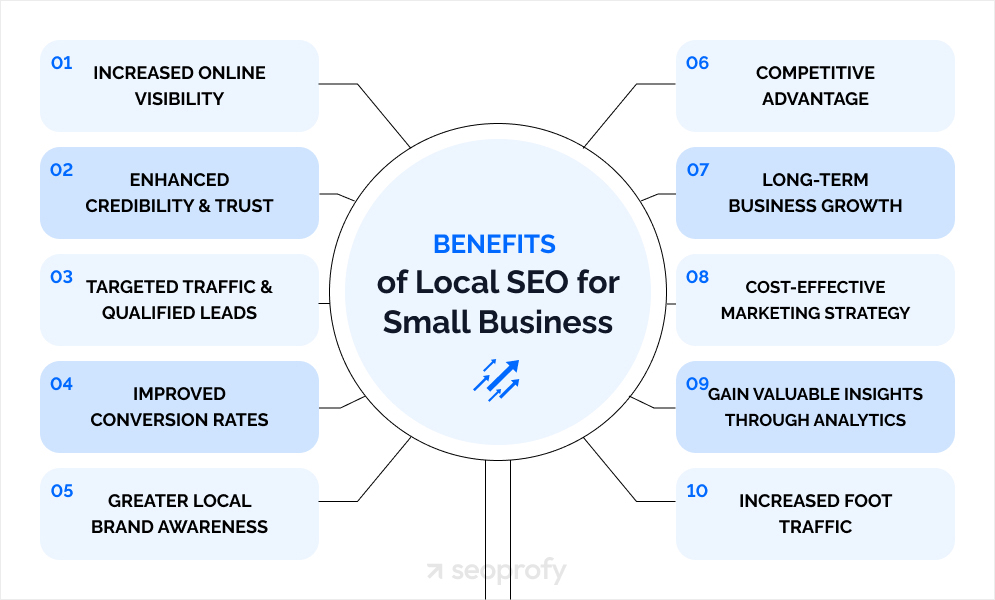
SEO vs. Local SEO: What’s the Difference?
The key difference is that SEO promotes your brand to a global audience, while local SEO targets nearby customers. Regular SEO focuses on broader search terms like “how to fix a leaky faucet,” regardless of location.
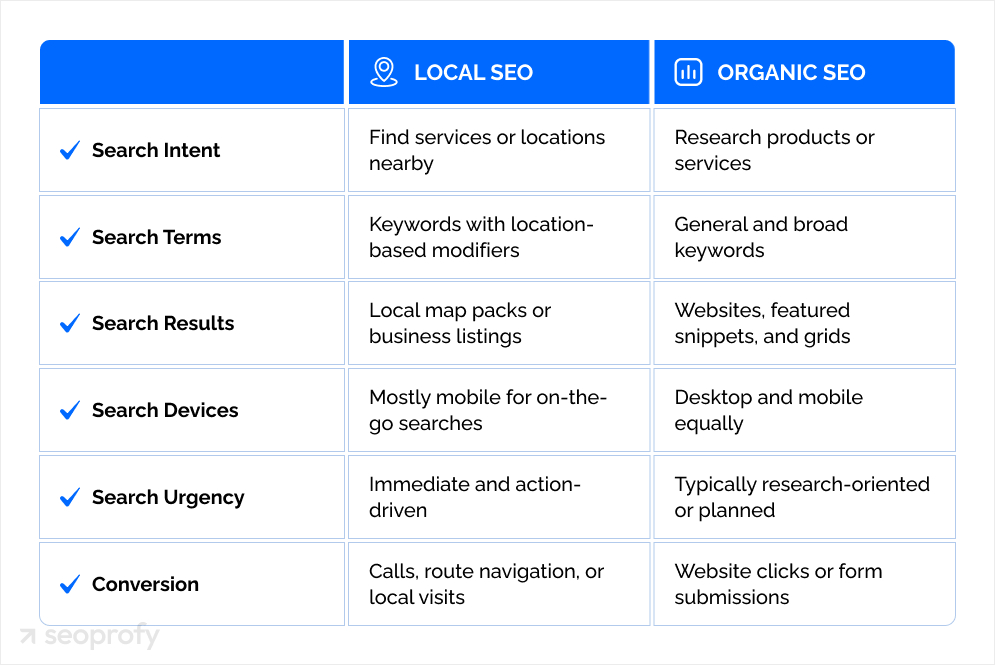
Local SEO services, as we’ve defined, allow you to target customers nearby with more specific keywords that include your location, like “How to fix a leaky faucet Atlanta.” Ultimately, regular SEO success might mean high organic traffic and sales from around the world, but the success of SEO for small local business translates to more foot traffic, local phone calls, and more customers from your community.
You may also come across another term — geo-targeted SEO. It defines any strategy that optimizes websites for specific geographic areas, like cities, regions, or countries. While geo-targeted techniques are used in local SEO, they’re not limited to companies with a physical presence.
Top 3 Local SEO Ranking Factors
Search engines use many parameters to determine website rankings. However, when it comes to local searches, they particularly prioritize the following local SEO ranking factors.
Factor №1: Does Your Content Meet Search Intent?
Search engines aim to provide results that best match user intent. To rank well, your content should align with what people are searching for. When users look for “how to choose a lawyer” or “schedule a dental consultation,” Google prioritizes pages that directly address these queries.
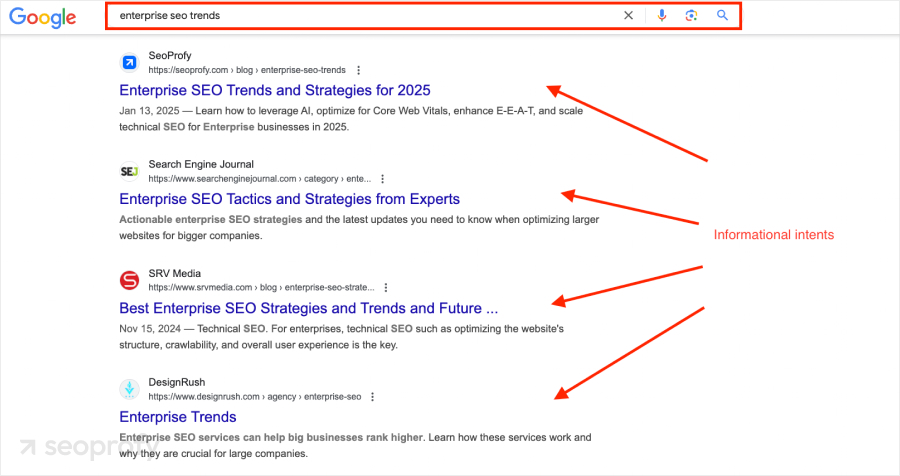
Factor №2: Is Your Business Nearby to the Searcher?
Proximity plays a crucial role in local searches. Search engines consider how close your business is to the user. A company may rank high in one area, but if the searcher is in another town, the results will differ significantly.
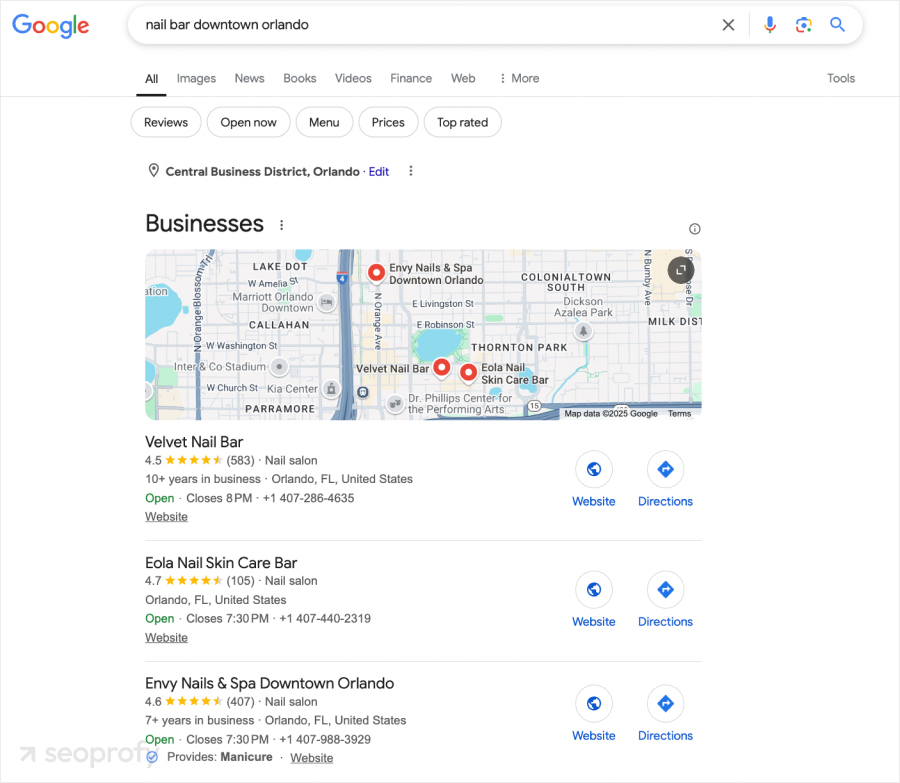
Factor №3: Is Your Local Business Recognized and Trusted?
Your online reputation impacts your local SEO rankings, too. Google and other search engines evaluate how helpful your content is, as well as reviews for both quantity and quality. It also looks for mentions of your brand across the web and links to your site from other local websites.
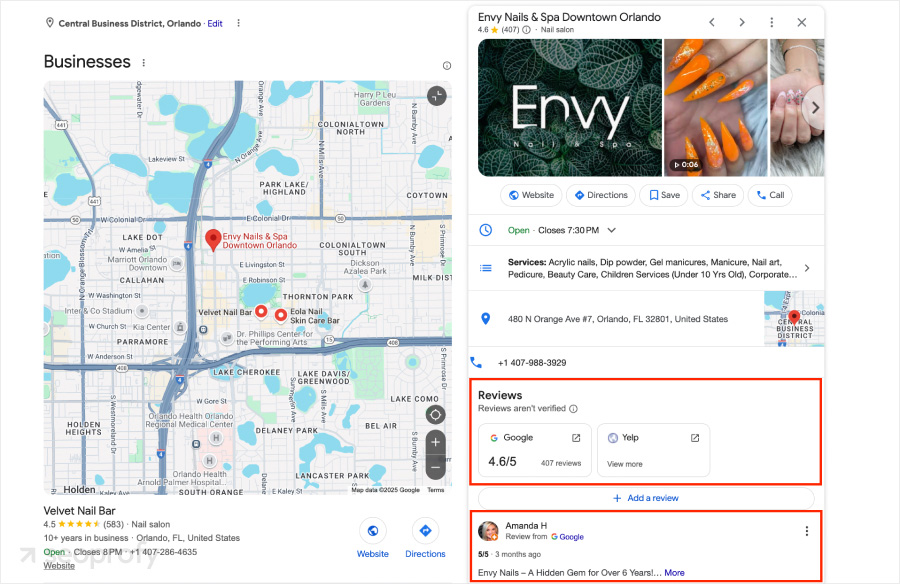
Local SEO for Small Enterprise: Strategies to Implement Now
Now that you understand the importance of local SEO for small businesses, let’s explore how exactly you can start attracting more customers.
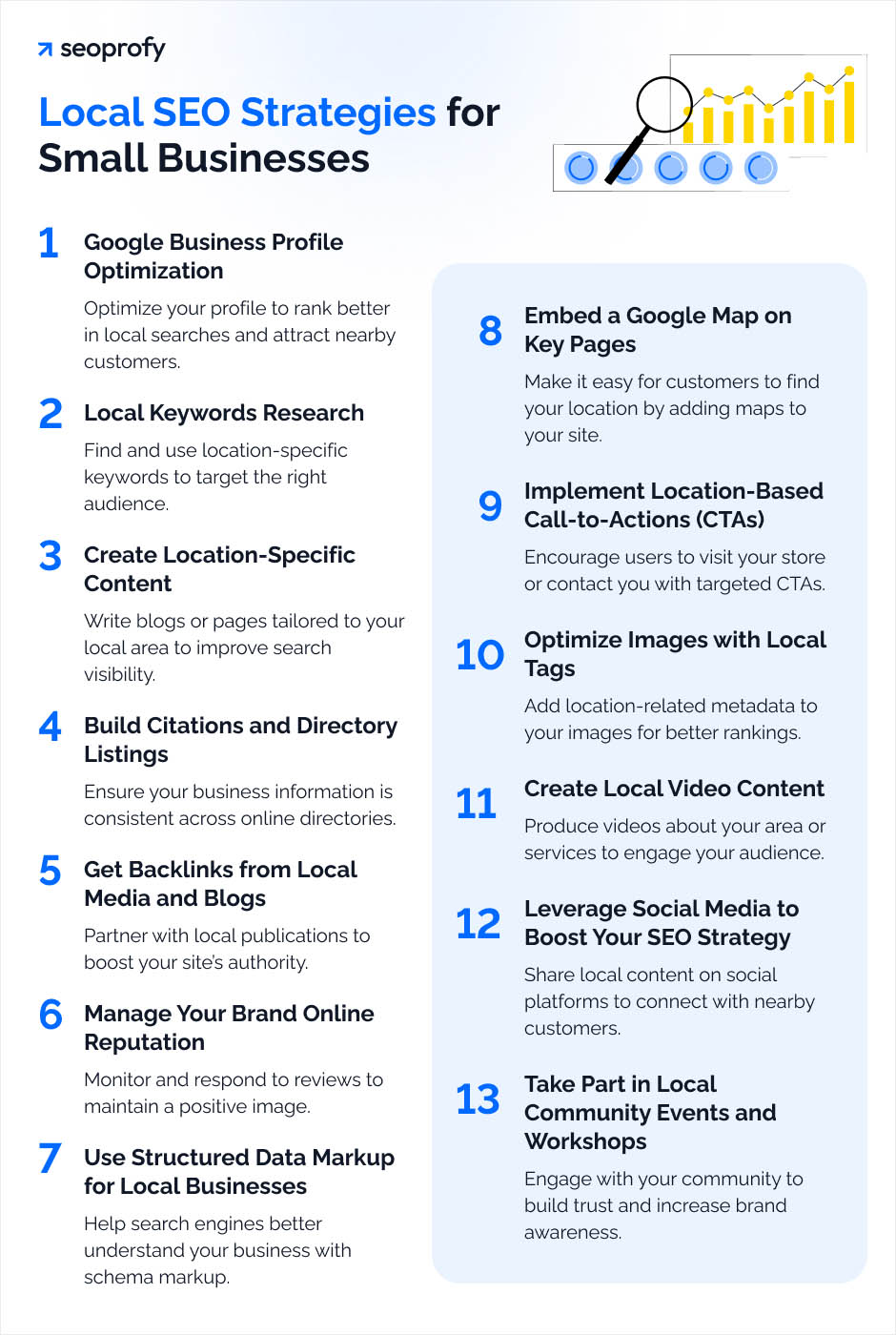
Optimize Google Business Profile
Ever noticed how some local businesses appear in a special box on Google with their key details, reviews, and images? This means each of them has set up a Google Business Profile (earlier Google My Business), a free business listing displayed when people search on Google or Google Maps.
To get started, go to Google Business Profile Manager, click ‘Create a profile,’ and enter your business name and category. You’ll then specify if you have a physical location and add your service area, contact details, and other required information.
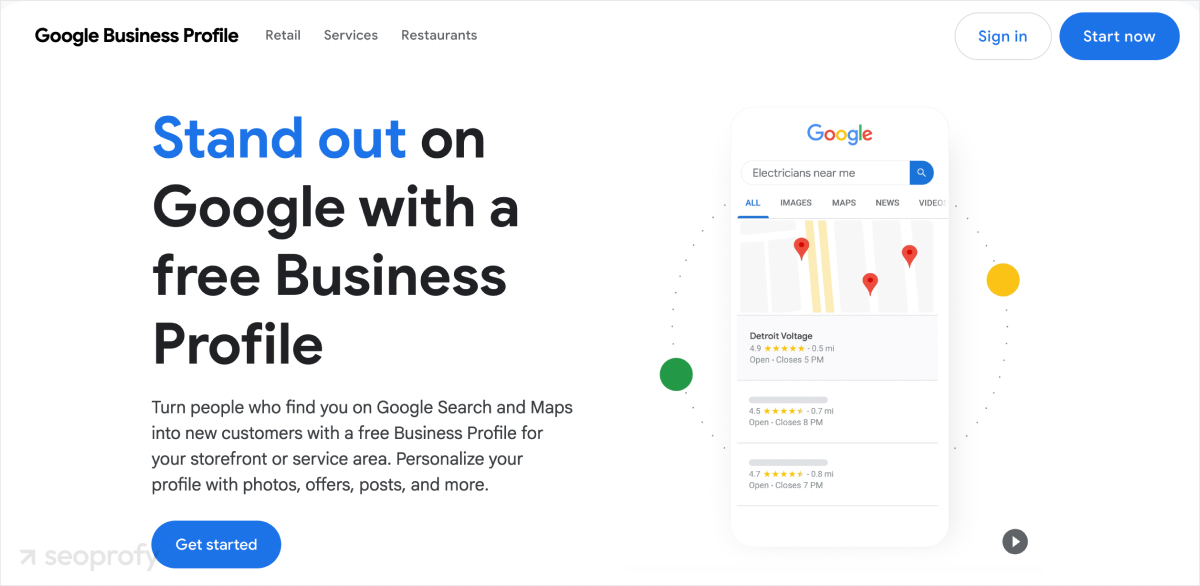
The final step is verification — Google confirms whether you’re a legitimate business owner through different ways: video recording, phone or text, email, live video call, and even by mail. Then, it will review the information you provided. The process takes up to 5 business days. Once verified, you’ll have full access to manage and optimize your profile.
If you want to realize all the benefits of local SEO for small businesses, ensure your profile is well-rounded. You should make sure your basic details, like business name, address, and phone number, are correct and consistent across all your online presence. Don’t overlook quality photos, as they help customers picture themselves using your products and services. All of these elements show Google and potential customers your business is thriving and trustworthy.
Manage Your Online Reputation
So, as we’ve found out, your online reputation directly impacts your local rankings. Thus, instead of simply waiting for a positive review, take a proactive approach and reach out to your satisfied customers first.
In addition, consider responding to reviews, especially negative ones. If you browse through Google Business Profiles in different niches, you may notice many companies simply ignore them. That’s a big missed opportunity! You could provide a calm and detailed response explaining your side of the story. Here’s how one clothing store in Boston reacted to bad feedback: they sincerely apologized. Sounds nice and inviting, right?
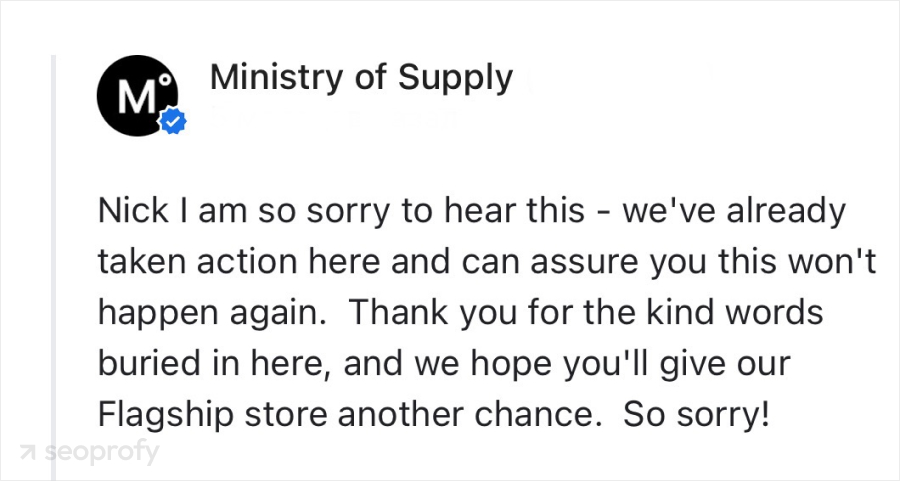
Your reply may look particularly professional against the backdrop of an angry customer’s feedback. After, you can go further and sort out concerns privately. And who knows, maybe that unhappy client might appreciate your attention so much that they even change their negative review into a positive one.
Conduct Local Keyword Research
The right keywords are the core part of search engine optimization for local business. They must be used in various types of content, from page titles and descriptions to blog articles and service pages. However, it’s vital to incorporate them naturally, avoiding overstuffing. Excessive use or unnatural placement of keywords can lead to penalties from Google.
Your keywords should reflect what your customers type in Google when searching for your offerings and must be about both what you do and where you do it.
Additionally, the most effective keywords often include buying signals — phrases like “best,” “affordable,” “top-rated,” or “24/7.” These terms indicate someone is ready to make a decision. Yet, competing for these key phrases can be challenging, as many local businesses aim to rank high in organic search results.
Therefore, when choosing keywords, you need to consider their search volume and keyword difficulty. Search volume reveals how often a term is searched each month, while keyword difficulty shows how challenging it is to rank for it, given the current competition. Your goal is to identify keywords with substantial search volume but lower competition.
Develop Content Based on Google’s E-E-A-T Guidelines
Your chosen keywords will only be effective if your content is high-quality and actually addresses searchers’ needs, not just fills pages with text. As we know, authority is one of the main ranking factors in local SEO, and content is your powerful tool to sound expert and credible.
Your content must follow Google’s E-E-A-T principles:
- Experience: Demonstrating first-hand experience through detailed case studies
- Expertise: Showing you have knowledge of your field via clear explanations of complex topics
- Authoritativeness: Proving you’re industry-recognized with the help of interviews with other experts, media mentions, etc.
- Trustworthiness: Building credibility via content with verified facts and references to proven sources
Such content is valued by both search engines and users.
Create a Localized Content Strategy
A strong localized content strategy improves search rankings and connects with your target audience. Start by researching local customer behavior, preferences, and pain points. Use geo-specific keywords naturally in website content, blog posts, and meta descriptions.
If you’re a business that serves multiple locations, each location deserves its own page filled with specific, relevant information. This is what a law firm, Morgan & Morgan did. They created individual location pages for each city across the different states they serve:
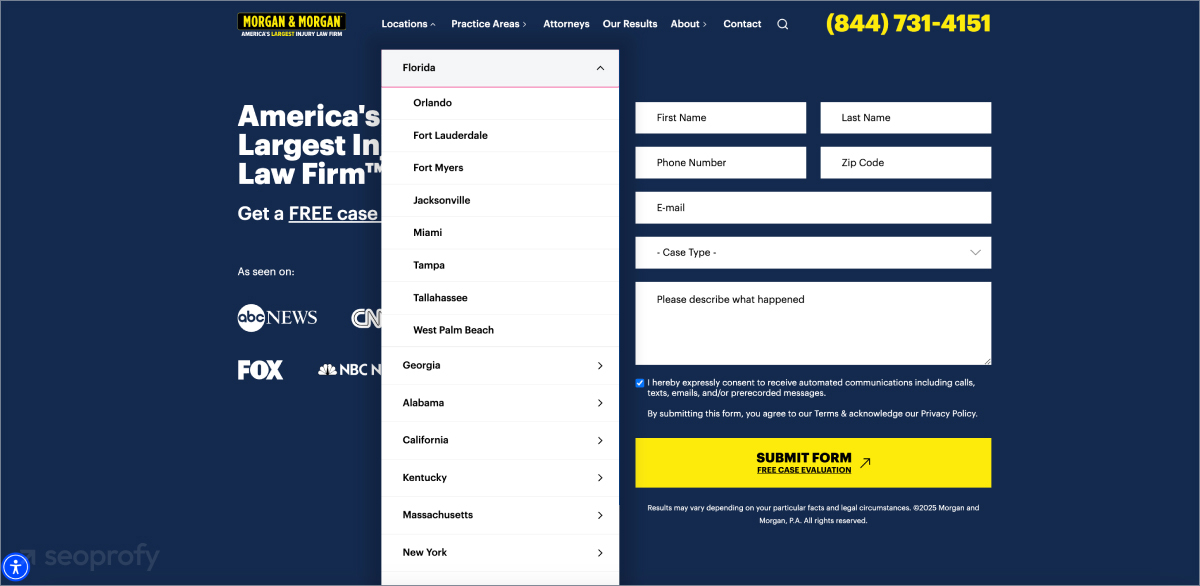
Another example is McDonald’s, which excels at localization by adapting its menu to regional tastes. In India, it offers the McAloo Tikki Burger for vegetarians, while in Japan, it features the Teriyaki Burger to match local flavors. This strategy strengthens its global brand while dominating local markets.
Need more local customers to find you online? Here are the services our local SEO company offers to help your business grow:
- Local SEO audit
- Google Business optimization
- Local keyword research
- Neighborhood-focused content

Acquire Citations on Directory Listings
Citations and online directories help boost local search rankings by verifying your business details. Ensure your NAP (name, address, phone) is consistent across platforms like Google Business Profile, Yelp, and industry-specific directories.
How to List Your Business
- Use the same NAP format everywhere (e.g., “Street” vs. “St.”).
- Add relevant local keywords naturally in descriptions.
- Fill out all fields, including hours, website, and services.
- Upload high-quality images to improve visibility.
- Encourage and respond to customer reviews.
Accurate and optimized listings improve trust, rankings, and customer engagement.
Every location has its own local business directories, which often include websites for chambers of commerce and neighborhood associations. For instance, if you own a restaurant in Portland, Maine, you could be listed on PortlandOldPort.com, a go-to place for diners:
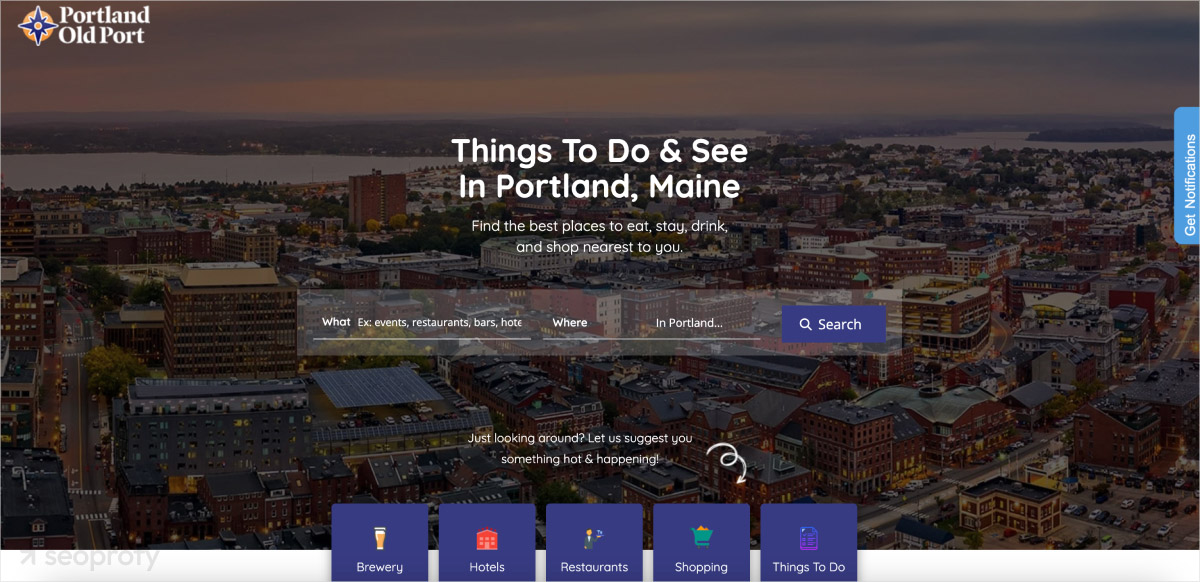
When Google notices your business information is present across reliable local sources, it becomes more confident in your business’s legitimacy and relevance. And, of course, these citations let your ideal customers know of your brand’s existence.
Get Backlinks from Local Media and Blogs
Backlinks from reputable local sources strengthen your small business local SEO strategy. Local news sites, industry blogs, and community websites can improve credibility and rankings.
To earn quality backlinks, pitch newsworthy stories about your business, such as events, partnerships, or unique services. Write guest posts for local blogs, featuring valuable insights on local SEO for startups. Engaging with community forums and sponsoring local events can also attract organic links.
While backlinks boost authority, the SEO results time frame varies—some improvements appear in weeks, while competitive markets may take months. A consistent process of local link building accelerates progress and enhances long-term visibility.
Implement Schema Markup for Local Business
Schema markup helps search engines better understand and rank your business for local searches. Adding LocalBusiness schema improves visibility by displaying key details like NAP, hours, and reviews in search results.
Use schema markup to structure your data correctly. This enhances rankings, strengthens your Google Business Profile, and makes your business more discoverable.
Star ratings, when implemented through schema markup, enhance credibility and attract more clicks by showcasing customer feedback directly in search results. These are fancy, expanded listings that can also display star ratings, prices, and availability. Compare these two search results — one with just the title and description and another with star ratings as well. Which option will generate more clicks?
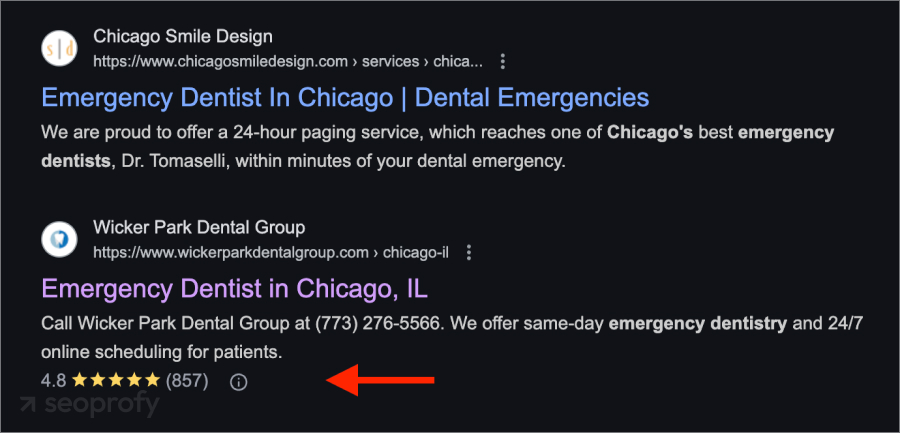
Indeed, the result with star ratings is the most visually appealing, and the five-star rating, derived from 857 reviews, inherently fosters trust and can be a part of the strategy for local SEO for small business growth.
Advanced Local SEO Strategies for Small Businesses
While the core strategies we’ve discussed can significantly boost your local visibility, why stop there? Here are some additional tips to consolidate results from your small business local SEO.
Embed a Google Map on Key Pages
From a customer’s perspective, an embedded map proves that you cover their local area. This way, they don’t have to copy your address, then open Google Maps separately, and then insert it there. Visitors can see how far they are from you with one click. Plus, businesses with multiple locations can make it easy for customers to find the closest store.
This feature not only improves user experience but also emphasizes your business location for search engines. Just make sure to embed the map directly from your Google Business Profile listing and place it where customers expect to see it, such as on your contact page and location-specific pages.
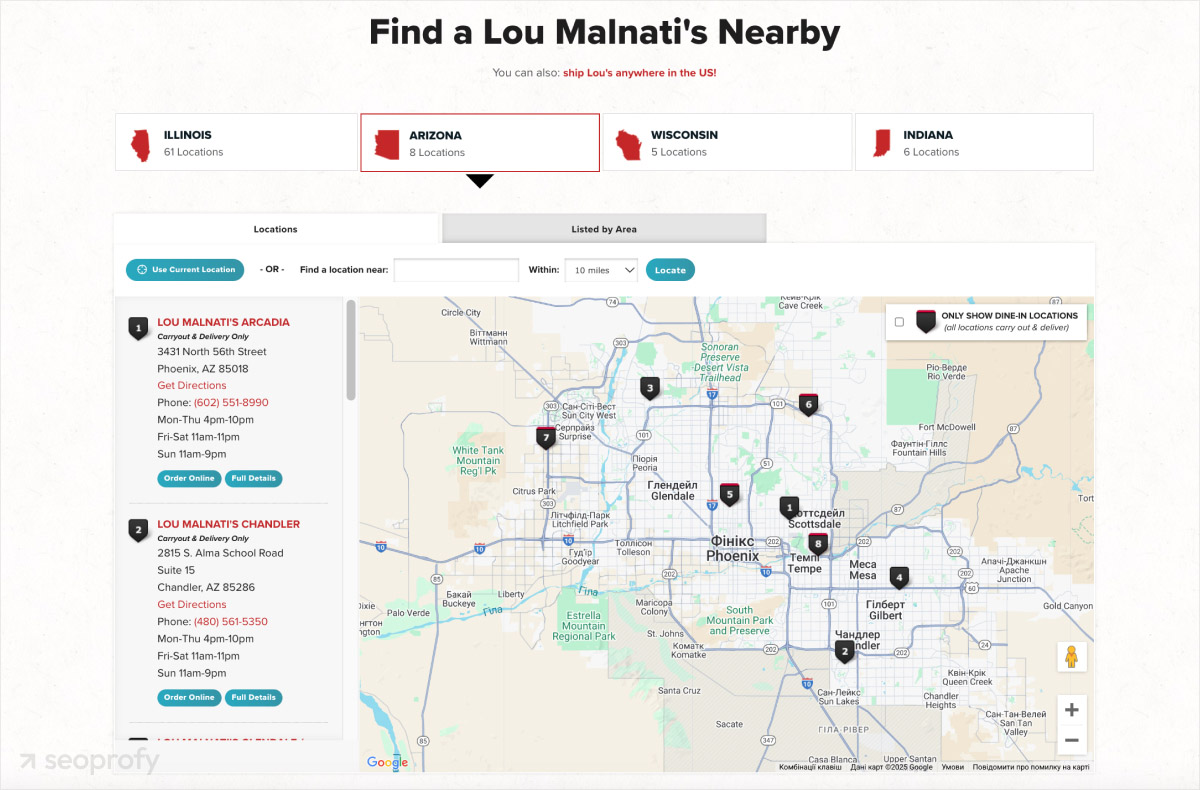
Implement Location-Based Call-to-Actions (CTAs)
Generic CTAs like “Contact Us” or “Book Now” work, but ones that mention specific locations feel way more relatable. Such CTAs clear up any confusion about whether their click will lead them to the right affiliate and boost the chances website visitors take action. Just remember to keep it balanced — your CTAs should be local but also short and sweet. For instance, “Call Our Seattle Office” or “Contact Our Denver Team.”
Optimize Images with Local Tags
Why not use any opportunity to increase your small business online visibility? In fact, if you publish pictures on your website, you can take advantage of them, too. When you upload these images, pay attention to their names: are they “office.jpg” or “team.png”? If yes, take another route.
Instead of just “storefront.jpg,” try “manhattan-soho-boutique-storefront.jpg.” This way, your images have a better chance of appearing in local image searches.
Alt (alternative) text presents another opportunity for local optimization. It’s a short description of what’s in an image that pops up when the photo doesn’t load or if someone’s using a screen reader. While it mainly helps people with visual impairments understand what the image is about, it can also work this way for Google search. For example, if you have a picture of your latest collection, you could use alt text like “New arrivals at our SoHo location.”
Create Local Video Content
Video content lets you show, not just tell, what makes your local business special. You can give future customers a glimpse into your place and the neighborhood. Or share clips of your team working and interacting with customers. Just don’t forget to tag your videos with location-specific titles and descriptions so they pop up when locals search and boost SEO for small local businesses.
Leverage Social Media to Boost Your SEO Strategy
Speaking of videos, you don’t have to publish them on your website only. You likely meet so many brands on Instagram, TikTok, Meta, and other social media platforms. So, include them in your next digital marketing strategy, too.
Take this account on TikTok, @loveluxury.co.uk, for example.

As the name suggests, they sell luxury items like bags, watches, and jewelry. The heart of their content is videos showing customers coming to buy or sell Hermes bags. The videos are interestingly staged and edited, and they’re fun to watch, even if you’re not a Birkin bag connoisseur.
This is how this local business has become famous worldwide and attracts customers from different countries. Thanks to TikTok, they increased both website and foot traffic and, of course, conversions. And while the fate of TikTok is uncertain in the US at the time of writing, while it’s accessible, each new day can bring you clients.
You don’t need fancy videos or perfect productions. If you’re authentic and post content consistently, you have all the chances to draw more attention to your local brand.
Take Part in Local Community Events and Workshops
Your local community also offers some opportunities to enhance your local SEO for small companies. They don’t just host networking events — their websites often feature member businesses. This means valuable backlinks and social media mentions for your website. What’s more, local media tends to cover businesses that support the community.
Conclusion
Local SEO for small business websites lets you adapt to a major change in customer purchasing behavior. Before visiting a business in person, people tend to “research” them online: view photos, read online reviews, and check working hours. If you provide this possibility, you’ll see increased traffic to your website and store and higher sales.
However, SEO for small local business involves many specifics. A single mistake can negatively impact your local search rankings, as Google has strict optimization guidelines. SeoProfy follows these guidelines like perfectionists. And we are! Every strategy we provided in this article is based on our successful experiences helping businesses thrive locally.
Reach out to us today, and our skilled team will be happy to create a tailored small business SEO strategy!












